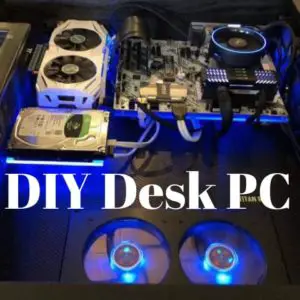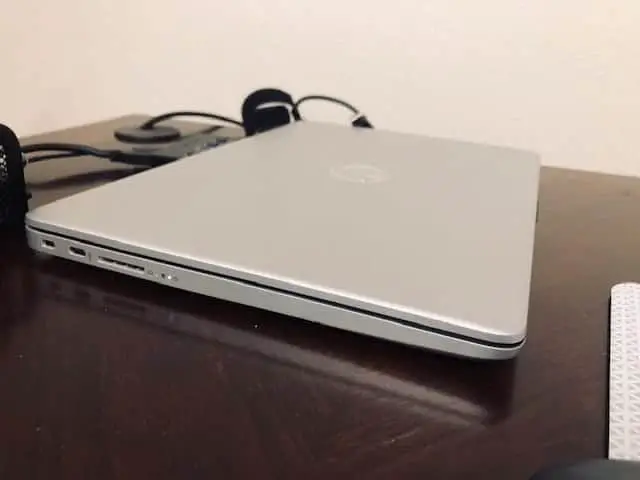We have a lot of computers in our home. Laptops, desktops, and of course our epic DIY computer in a desk. I got to wondering if all of this added up to one big fire hazard. I’ve done a lot of research on it and this is what I’ve learned.
Can a computer catch on fire? A computer can catch on fire due to electrical shortages in the wiring, malfunctioning laptop batteries, or excessive dust in the case. Simple maintenance and common-sense practices can greatly reduce the fire hazard associated with computers.
Let’s have a look at the risks of a computer catching on fire and what we can do to prevent it.
Electrical Shortages
Faulty power supplies can shortcircuit, resulting in a fire. Although most power supplies designed for desktop PCs are housed in some form of metal casing, there still exists a risk of sparks or flames.
Turning your PC off when not in use is often recommended as a best practice. A side benefit to this is that it also reduces the wear and tear on computer components and can increase the longevity of your system versus letting it run 24/7.
Of course, there are still all of those other electronic peripherals that have power running to them all the time. Printers, monitors, etc. What about those?
I’m a big fan of master/slave power supply surge protectors like this one that Amazon carries. You connect your monitor, printer, and other dependant peripherals to the slave plugs and your PC to the master plug.
When the PC is turned on, the printer, monitor and any other devices that are connected as slave devices turn on automatically. When you turn the PC off, power is cut to those slave devices.
It has the benefit of saving on your electric bill at the same time that it is reducing the risk of fire from electrical devices being left on all the time.
Win-win!
Malfunctioning Laptop Batteries Can Cause Fire
Everyone remembers the exploding Samsung cellphone debacle but there are a significant number of recalls for computers taking place all of the time due to faulty battery issues that could result in a fire hazard.
In June 2019, the Consumer Product Safety Commission announced a recall of certain Apple MacBooks due to the risk of the battery overheating and causing a fire (source).
And there are more stories like this than we can track.
Laptop batteries are getting more powerful in order to meet the growing demands of consumers but with that power comes increased risk. While manufacturer’s like Apple maintain impressively high-quality standards there still exist opportunities for these issues.
It would seem that dormant laptop in sleep mode has a lower probability of fire hazard than one in use. That’s when the battery is more likely to heat up.
And for the record, Apple is in no way alone in dealing with these laptop battery fire hazard issues. In January 2019, HP recalled batteries for certain HP notebooks also citing the risk of overheating and fire (source).
Fortunately, in those cases, HP was able to send a replacement battery instead of having to recall the entire laptop like Apple had to since their batteries are not designed to be user replaced.
Another issue with overheating of laptops, in particular, is the habit of placing them on a soft surface such as a bed or pillow while using them.
This can prevent proper airflow depending on the location of the intake fans. Always place them on a solid surface. A simple laptop desk cushion like this is an easy solution to this problem.
Excessive Dust In Your PC Could Be A Fire Hazard
We forget sometimes that our PCs are constantly pulling air in and exhausting it to keep the system components cool. Over time, that dust can really build up. Flammable dust particles sitting on electronic components is a recipe for disaster.
Another concern is the buildup of dust on fans to the extent that they can no longer actively cool your system. This could result in overheating and, again, fire hazard (source).
Prevention is the best approach in this case. Regularly clean the fans and inside of the computer (if it is accessible). I like to use canned pressurized air for this. You can see options and check prices on Amazon by clicking here.
The key is to routinely inspect the intake and exhaust fans and, if possible, open the system and ensure that dust has not collected inside.
Conclusion
Electronic devices provide us with a wealth of power and information at our fingertips. But they do provide a fire risk and we need to be mindful of that. Keep these important points in mind to reduce the risk of fire caused by a computer:
- Turn off computers and peripherals when not in use.
- Place laptops on firm, solid surfaces when using to ensure proper airflow.
- Regularly clean fans and components to prevent dust buildup.
These are simple practices but it is often the most obvious solutions that we tend to overlook. Work smart and work safely. Computers are awesome but they aren’t fireproof.
If you would like to learn about building an EPIC gaming battlestation, be sure to read our articles on how to build a computer in a desk.

